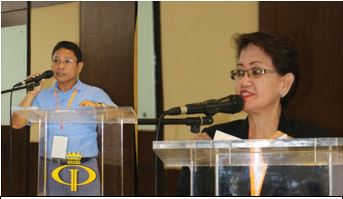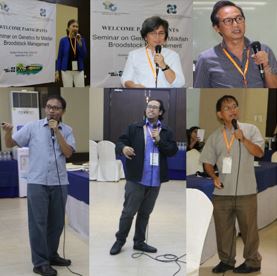The Philippine Council for Agriculture, Aquatic, and Natural Resources Research and Development (PCAARRD) of the Department of Science and Technology conducted a seminar on genetics for milkfish broodstock management.
Held at the Golden Prince Hotel, Cebu City on September 15, 2017, the seminar was organized by PCAARRD’s Inland Aquatic Resources Research Division (IARRD) in coordination with the Bureau of Fisheries and Aquatic Resources (BFAR) Regional Fisheries Office VII.
The seminar aimed to provide information on the genetic quality of milkfish broodstock sourced from wild fry and hatchery-produced fry; use of molecular markers for marker-assisted selection; and breeding, cloning and sequencing of lectin genes and microbial pathogens of milkfish.
Information on the genetic quality of milkfish broodstock and hatchery-produced fry and fingerlings as well as the genetic diversity of wild populations of milkfish as potential sources of future broodstock development are vital for selection and breeding.
In his opening remarks, Mr. Mario Ruinata, Assistant Regional Director of BFAR VII, talked about the five-year milkfish roadmap (2018-2022).
Ruinata said that the roadmap aims to increase milkfish production, sustain milkfish fry requirements, generate livelihood opportunities, provide alternative markets for milkfish, and improve quality of processed products.
The program includes the expansion of milkfish hatcheries, broodstock development and improvement, support for the modernization of postharvest and processing facilities, and identification of local and international markets.
“The milkfish industry fills a greater role in fish production to feed the increasing population, but problems like poor quality of seed stocks, high production cost, and conflict of aquaculture with other resource uses need to be addressed,” Ruinata said.
Ruinata added that the seminar was very timely and appropriate since milkfish production is greatly dependent on the quality of fry/fingerlings for survival and growth.
The following topics were discussed during the seminar by selected resource persons:
- Status of the milkfish industry by Mr. Wilfredo G. Yap, Executive Director of SANTEH Aquaculture S&T Foundation Inc.;
- Broodstock development of milkfish by Dr. Evelyn Grace Ayson of Southeast Asian Fisheries Development Center/Aquaculture Department (SEAFDEC-AQD),which was presented by Engr. Eduardo V. Manalili, Senior Science Research Specialist of IARRD-PCAARRD;
- Genetics of Hatchery-bred Milkfish for Sustainable Aquaculture by Dr. Zubaida U. Basiao, retired professor of University of the Philippines Diliman (UPD) – Institute of Biology (IB) and Program Leader of Milkfish R&D Program;
- Microsatellites and RAPD Markers for Milkfish Broodstock Management by Dr. Ma. Rowena R. Eguia of SEAFDEC-AQD;
- Genetics for Milkfish Populations in the Wild Using Mitochondrial DNA Markers by Dr. Jonas P. Quilang of UPD-IB;
- Cloning and Sequence Analysis of Milkfish Lectin Genes by Mr. Lorenz Rhuel P. Ragasa also from UPD-IB; and
- Molecular Identification of Microbial Pathogens by Dr. Edward Barlaan of University of Southern Mindanao, Kabacan, North Cotabato.
Sixty-six participants composed of technical staff from BFAR Regional Fisheries Offices 1, 3, 7-13, and ARMM; researchers from Romblon State University, Southern Luzon State University, Laguna State Polytechnic University, University of the Philippines Visayas, Isabela State University, University of San Carlos, Visayas State University, and Zamboanga State College of Marine Science and Technology; including representatives from the private sector attended the seminar.
Dr. Fernandez and Dr. Basiao encouraged researchers to submit proposals for PCAARRD funding and to collaborate with other researchers.
In her closing remarks, Dr. Fernandez said that she hoped that the participants would be able to put into practice the knowledge that they gained from the training.



